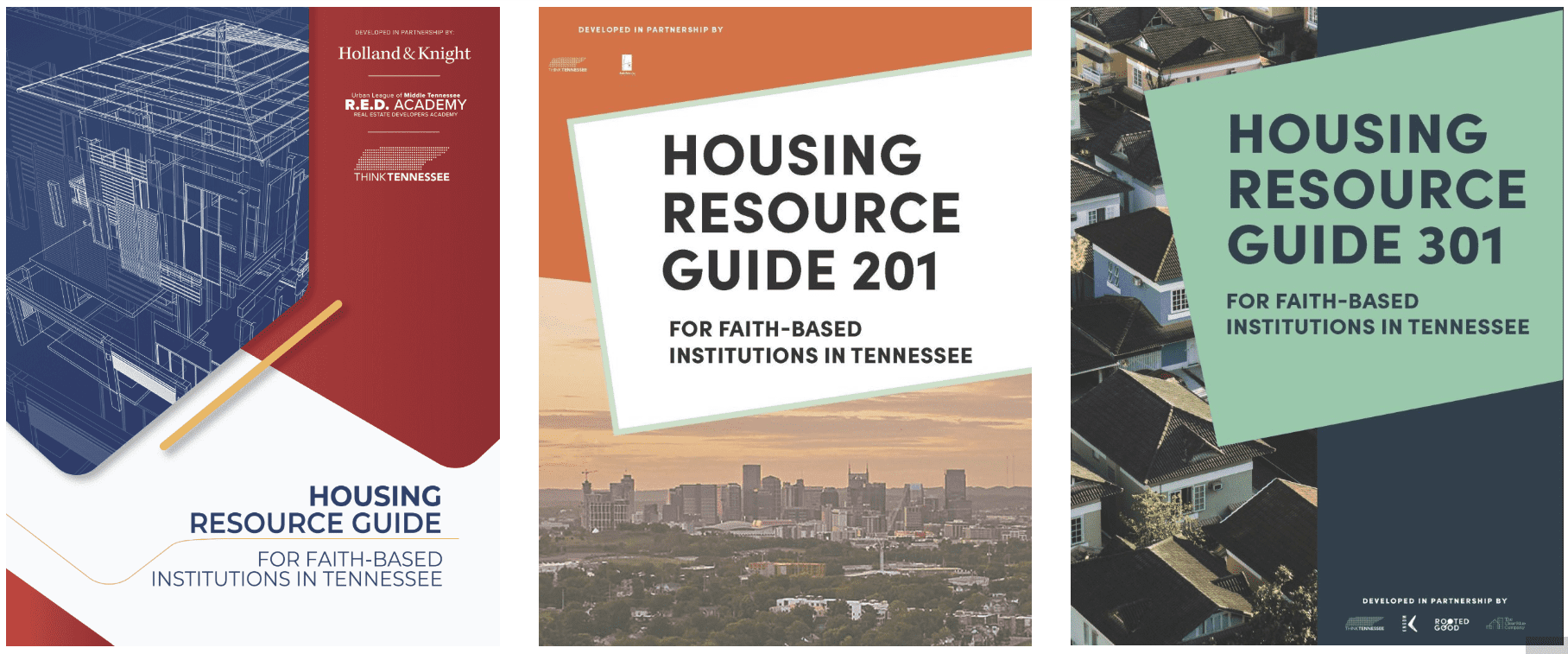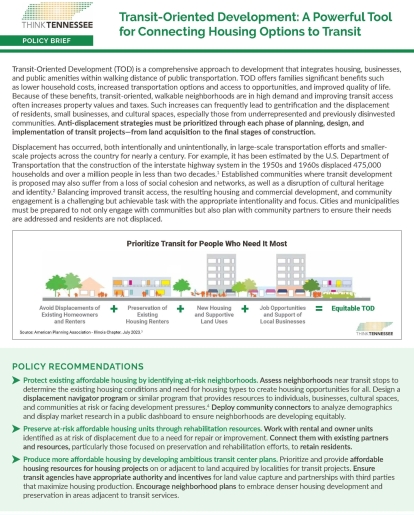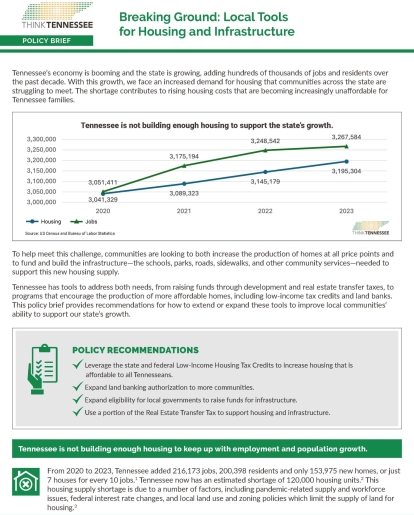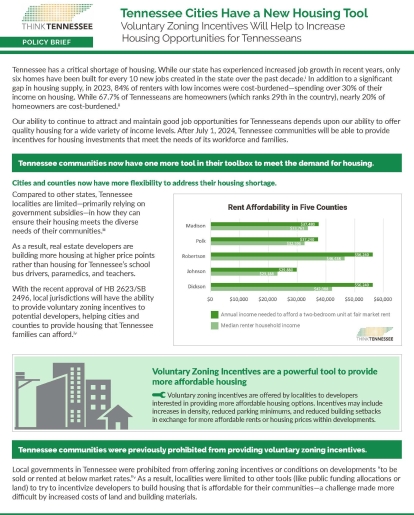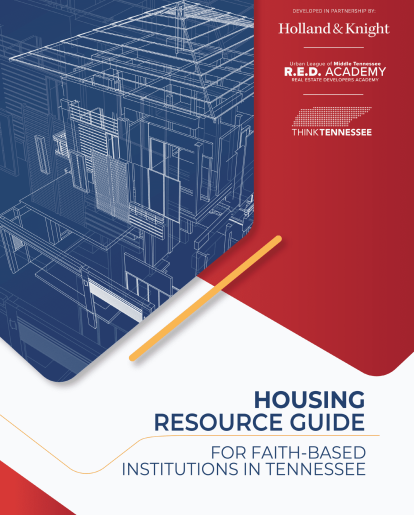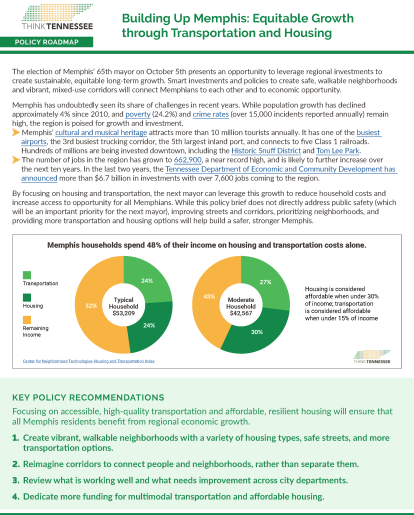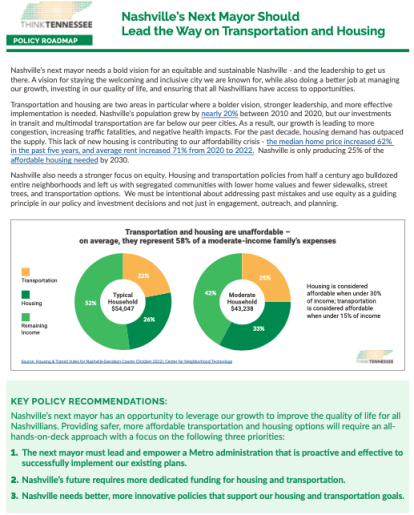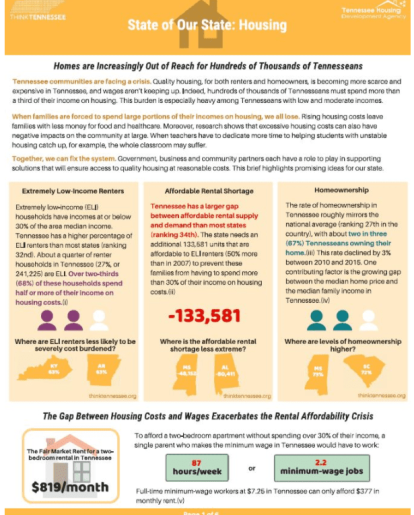Housing
Housing Resource Guides for Faith-Based Institutions in Tennessee 101, 201, and 301 (2024)
ThinkTennessee, in partnership with ULI Nashville, the Urban League of Middle Tennessee, Hawkins Partners, Inc., Urban Housing Solutions, ClearBlue Company, and other community advocates, has collaborated on a series of three resource guides intended to help faith congregations understand the basics of housing development and determine their potential and priorities.
TRANSIT-ORIENTED DEVELOPMENT: A POWERFUL TOOL FOR CONNECTING HOUSING OPTIONS TO TRANSIT (2025)
By strategically placing housing, businesses, public facilities, and amenities within walking distance of public transportation, transit-oriented development (TOD) creates walkable, “complete” mixed-use neighborhoods that optimize land use. Research shows that TOD offers families significant benefits, such as increased transportation and housing options, leading to an improved quality of life and economic mobility. However, because of these benefits, transit-oriented, walkable neighborhoods are in high demand. As a result, improving transit access often increases property values and taxes. Both factors can lead to gentrification and displacement, particularly in previously disinvested communities.
Our brief includes three policy recommendations to protect, preserve, and produce housing options in impacted communities. The report also details examples of anti-displacement strategies and provides several case studies from across the country.
BREAKING GROUND: LOCAL TOOLS FOR HOUSING AND INFRASTRUCTURE (2025)
Tennessee Cities Have a New Housing Tool: Voluntary Zoning Incentives Will Help to Increase Housing Opportunities (2024)
Tennessee has a critical shortage of housing. With the recent approval of HB 2623/SB 2496, local jurisdictions will now have the ability to provide voluntary zoning incentives to promote housing development that is affordable, relieve the pressure of the current housing market by increasing housing supply, and encourage a higher rate of housing construction in line with job growth. Our policy brief describes what Tennessee cities need to know about the availability of this new tool, including the types of incentives that can be offered through voluntary incentive programs and the process for implementing those incentives.
Housing Resource Guide for Faith-Based Institutions (2024)
The Housing Resource Guide for Faith-Based Institutions is a guide designed for faith-based institutions interested in developing their land for affordable housing opportunities in their communities and for their congregations. Affordable housing is a challenge for many cities across the state and it requires all partners to focus and prioritize increasing housing options for all. Identifying land for affordable housing development is typically one of the most difficult steps in these real estate development transactions. Institutions, whether public, academic, healthcare, or faith-based, can play a significant role in expanding housing affordability and mobility given the amount of land they own, their locations, and accessibility to transportation options and services. This guide is to serve as an initial resource for faith-based institutions to support decisions in developing their land, partnerships, and their role in housing affordability discussions across the state.
The guide is developed and written by Holland & Knight Law Firm, the Urban League of Middle Tennessee’s Real Estate Development (R.E.D.) Academy, and ThinkTennessee.
Building Up Memphis: Equitable Growth through Transportation and Housing (2023)
The election of Memphis’ 65th mayor presents an opportunity to leverage regional investments to create sustainable, equitable long-term growth. Smart investments and policies to create safe, walkable neighborhoods and vibrant, mixed-use corridors will connect Memphians to each other and to economic opportunity.
This policy roadmap provides four recommendations to ensure that all Memphis residents benefit from regional economic growth: 1) Create vibrant, walkable neighborhoods with a variety of housing types, safe streets, and more transportation options; 2) Reimagine corridors to connect people and neighborhoods, rather than separate them; 3) Review what is working well and what needs improvement across city departments; and 4) Dedicate more funding for multimodal transportation and affordable housing.
Nashville’s Next Mayor Should Lead the Way on Transportation and Housing (2023)
Nashville’s next mayor has an opportunity to leverage our growth to improve the quality of life for all Nashvillians. Providing safer, more affordable transportation and housing options will require an all-hands-on-deck approach.
This policy roadmap provides three recommendations rooted in data and best practices to help Nashville’s mayor accomplish three priorities: 1) Lead and empower a proactive and effective Metro administration; 2) Secure more dedicated funding for housing and transportation; and 3) Institute innovative policies to meet our housing and transportation goals.
State of Our State: Housing (2018)
Quality housing for renters and homeowners is becoming scarcer and more expensive in Tennessee. Hundreds of thousands of Tennesseans spend more than a third of their income on housing.
Developed in partnership with the Tennessee Housing Development Agency, this policy brief addresses the housing affordability crisis in our state and provides a comprehensive look at how unstable and unaffordable housing impacts other outcomes, such as health and education.
The brief also highlights solutions other states have implemented to improve housing affordability, providing a roadmap of possible next steps for Tennessee policymakers.

